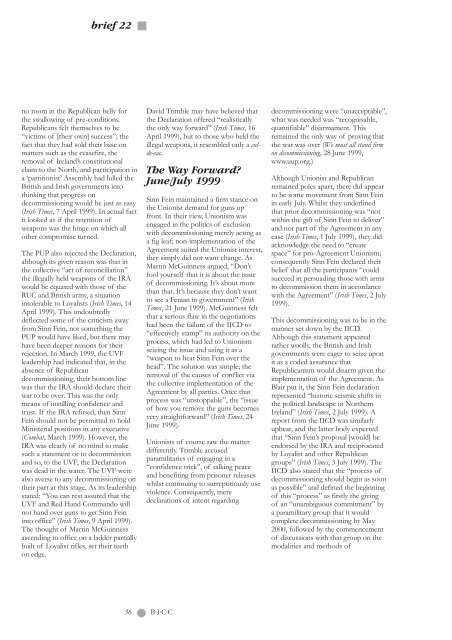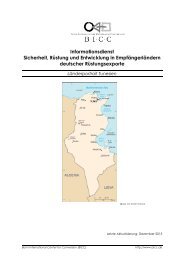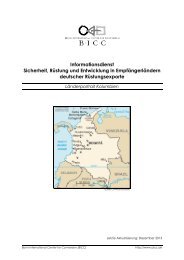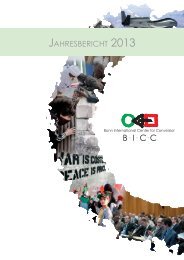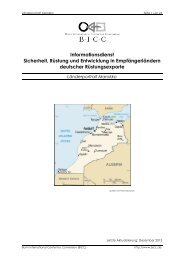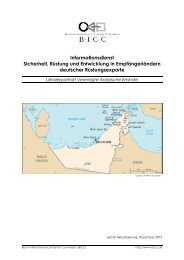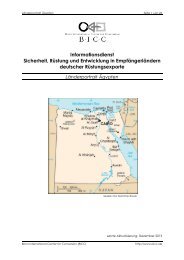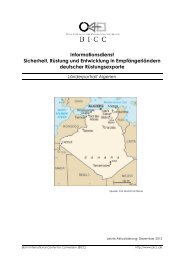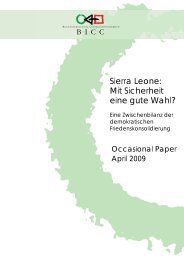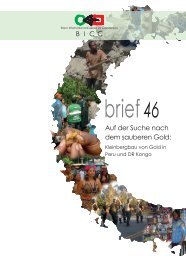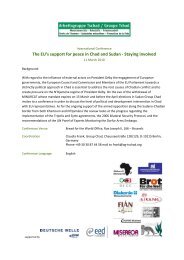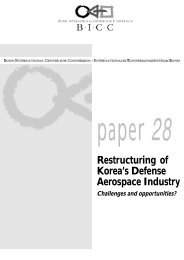English - BICC
English - BICC
English - BICC
Create successful ePaper yourself
Turn your PDF publications into a flip-book with our unique Google optimized e-Paper software.
ief 22<br />
no room in the Republican belly for<br />
the swallowing of pre-conditions.<br />
Republicans felt themselves to be<br />
“victims of [their own] success”; the<br />
fact that they had sold their base on<br />
matters such as the ceasefire, the<br />
removal of Ireland’s constitutional<br />
claim to the North, and participation in<br />
a ‘partitionist’ Assembly had lulled the<br />
British and Irish governments into<br />
thinking that progress on<br />
decommissioning would be just as easy<br />
(Irish Times, 7 April 1999). In actual fact<br />
it looked as if the retention of<br />
weapons was the hinge on which all<br />
other compromise turned.<br />
The PUP also rejected the Declaration,<br />
although its given reason was that in<br />
the collective “act of reconciliation”<br />
the illegally held weapons of the IRA<br />
would be equated with those of the<br />
RUC and British army, a situation<br />
intolerable to Loyalists (Irish Times, 14<br />
April 1999). This undoubtedly<br />
deflected some of the criticism away<br />
from Sinn Fein, not something the<br />
PUP would have liked, but there may<br />
have been deeper reasons for their<br />
rejection. In March 1999, the UVF<br />
leadership had indicated that, in the<br />
absence of Republican<br />
decommissioning, their bottom line<br />
was that the IRA should declare their<br />
war to be over. This was the only<br />
means of instilling confidence and<br />
trust. If the IRA refused, then Sinn<br />
Fein should not be permitted to hold<br />
Ministerial positions in any executive<br />
(Combat, March 1999). However, the<br />
IRA was clearly of no mind to make<br />
such a statement or to decommission<br />
and so, to the UVF, the Declaration<br />
was dead in the water. The UVF were<br />
also averse to any decommissioning on<br />
their part at this stage. As its leadership<br />
stated: “You can rest assured that the<br />
UVF and Red Hand Commando will<br />
not hand over guns to get Sinn Fein<br />
into office” (Irish Times, 9 April 1999).<br />
The thought of Martin McGuinness<br />
ascending to office on a ladder partially<br />
built of Loyalist rifles, set their teeth<br />
on edge.<br />
David Trimble may have believed that<br />
the Declaration offered “realistically<br />
the only way forward” (Irish Times, 16<br />
April 1999), but to those who held the<br />
illegal weapons, it resembled only a culde-sac.<br />
The Way Forward?<br />
June/July 1999<br />
Sinn Fein maintained a firm stance on<br />
the Unionist demand for guns up<br />
front. In their view, Unionism was<br />
engaged in the politics of exclusion<br />
with decommissioning merely acting as<br />
a fig leaf; non-implementation of the<br />
Agreement suited the Unionist interest,<br />
they simply did not want change. As<br />
Martin McGuinness argued, “Don’t<br />
fool yourself that it is about the issue<br />
of decommissioning. It’s about more<br />
than that. It’s because they don’t want<br />
to see a Fenian in government” (Irish<br />
Times, 21 June 1999). McGuinness felt<br />
that a serious flaw in the negotiations<br />
had been the failure of the IICD to<br />
“effectively stamp” its authority on the<br />
process, which had led to Unionism<br />
seizing the issue and using it as a<br />
“weapon to beat Sinn Fein over the<br />
head”. The solution was simple; the<br />
removal of the causes of conflict via<br />
the collective implementation of the<br />
Agreement by all parties. Once that<br />
process was “unstoppable”, the “issue<br />
of how you remove the guns becomes<br />
very straightforward” (Irish Times, 24<br />
June 1999).<br />
Unionists of course saw the matter<br />
differently. Trimble accused<br />
paramilitaries of engaging in a<br />
“confidence trick”, of talking peace<br />
and benefiting from prisoner releases<br />
whilst continuing to surreptitiously use<br />
violence. Consequently, mere<br />
declarations of intent regarding<br />
36 B·I·C·C<br />
decommissioning were “unacceptable”,<br />
what was needed was “recognisable,<br />
quantifiable” disarmament. This<br />
remained the only way of proving that<br />
the war was over (We must all stand firm<br />
on decommissioning, 28 June 1999,<br />
www.uup.org.)<br />
Although Unionist and Republican<br />
remained poles apart, there did appear<br />
to be some movement from Sinn Fein<br />
in early July. Whilst they underlined<br />
that prior decommissioning was “not<br />
within the gift of Sinn Fein to deliver”<br />
and not part of the Agreement in any<br />
case (Irish Times, 1 July 1999), they did<br />
acknowledge the need to “create<br />
space” for pro-Agreement Unionism;<br />
consequently Sinn Fein declared their<br />
belief that all the participants “could<br />
succeed in persuading those with arms<br />
to decommission them in accordance<br />
with the Agreement” (Irish Times, 2 July<br />
1999).<br />
This decommissioning was to be in the<br />
manner set down by the IICD.<br />
Although this statement appeared<br />
rather woolly, the British and Irish<br />
governments were eager to seize upon<br />
it as a coded assurance that<br />
Republicanism would disarm given the<br />
implementation of the Agreement. As<br />
Blair put it, the Sinn Fein declaration<br />
represented “historic seismic shifts in<br />
the political landscape in Northern<br />
Ireland” (Irish Times, 2 July 1999). A<br />
report from the IICD was similarly<br />
upbeat, and the latter body expected<br />
that “Sinn Fein’s proposal [would] be<br />
endorsed by the IRA and reciprocated<br />
by Loyalist and other Republican<br />
groups” (Irish Times, 3 July 1999). The<br />
IICD also stated that the “process of<br />
decommissioning should begin as soon<br />
as possible” and defined the beginning<br />
of this “process” as firstly the giving<br />
of an “unambiguous commitment” by<br />
a paramilitary group that it would<br />
complete decommissioning by May<br />
2000, followed by the commencement<br />
of discussions with that group on the<br />
modalities and methods of


